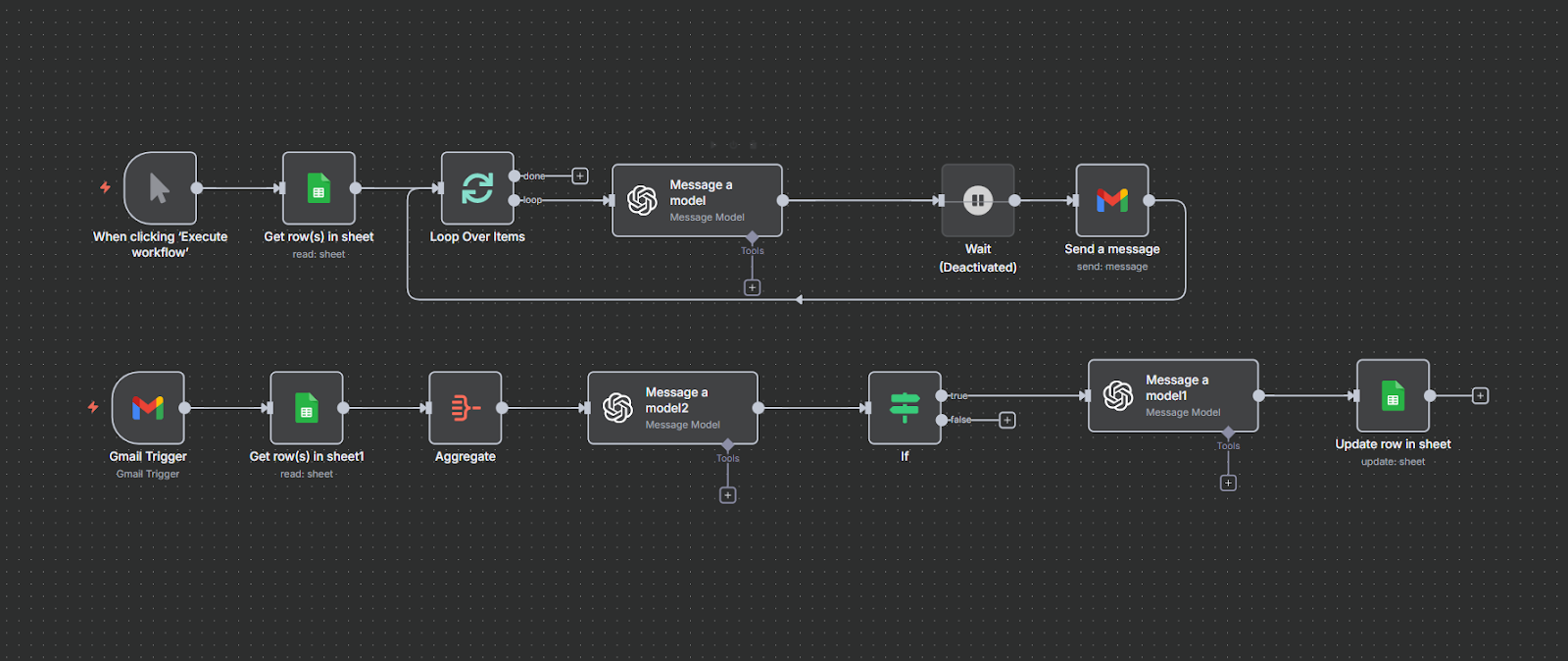AI Cold Email System - Automated cold mailing system with AI analysis of responses
.jpg)

Process description
This automation is a comprehensive system for conducting personalized email campaigns using artificial intelligence. The system consists of two interrelated workflows: the first automates the distribution of personalized commercial offers, the second analyzes customer responses and automatically classifies them by status of interest. AI agents generate unique emails for each customer and analyze their responses, ensuring full automation of the sales funnel at the initial contact stage.
API keys and services:
- Google Sheets API - customer database and status accounting
- Gmail OAuth2 - sending emails and monitoring incoming messages
- OpenAI API (GPT-3.5-Turbo) - generating emails and analyzing responses
System architecture
PART 1: MAILING WORKFLOW
1.1 Manual Trigger - Initiating a mailing list
Purpose: Manual launch of the mass mailing process
Benefits:
- Full control over shipping times
- The ability to pre-check the database
- Protection against accidental launches
1.2 Get row (s) in sheet - Loading customer base
Purpose: Extracting lead data from Google Sheets
Settings:
- Credentials: Google Sheets account
Data structure:
- First name - contact person's name
- Email - shipping address
- The company's activities - client's business area
- Status - current interaction status
1.3 Loop Over Items - Sequential Processing
Purpose: Organizing a cycle for personalized delivery to each customer
Settings:
- Batch Size: 1 (individual processing)
- Options: Default settings
It is important: Consistent processing prevents Gmail from being blocked for mass mailing and allows you to personalize each email.
1.4 Message a model - AI email generation
Purpose: Creating a unique personalized email for each customer
Settings:
- Model: gpt-3.5-turbo
- Temperature: Default (creativity)
- Max Tokens: Auto
System prompt:
Here's the Client's name: {{$json ['Name']}}
Here are the company's activities: {{$json ['Company activities']}}
Paraphrase and uniquely define the following text for a letter to the client:
[Basic email template with variables for personalization]
Prompt features:
- Uses customer data for personalization
- Rephrases the basic template for uniqueness
- Adapts the offer to the client's industry
- Preserves the structure and key messages
1.5 Wait — Delay between shipments (optional)
Purpose: Simulating human behavior and preventing spam filters
Settings:
- Amount: 10 seconds (30-60 seconds recommended)
- Status: Disabled (can be activated if needed)
1.6 Send a message - Send via Gmail
Purpose: Final sending of the generated email to the client
Settings:
- To: {{$ ('Get row (s) in sheet') .item.json.email}}
- Subject: “Collaboration”
- Body: {{$json.message.content}}
- Options: HTML formatting enabled
PART 2: RESPONSE ANALYSIS WORKFLOW
2.1 Gmail Trigger — Monitoring Inbox
Purpose: Automatically checking new emails every minute
Settings:
- Poll Times: Every Minute
- Filters: All messages (filters can be configured)
- Credentials: Gmail OAuth2
Optimization: You can set up filters by tags or keywords to process only relevant emails.
2.2 Get row (s) in sheet - Download the reconciliation database
Purpose: Getting an up-to-date customer base to verify senders
Settings: Identical to the settings in the mailing workflow
2.3 Aggregate - Preparing an email list
Purpose: Creating a single array of email addresses for quick verification
Settings:
- Fields to Aggregate: Email
- Operation: Collect all values
2.4 Message a model - Extracting sender's email
Purpose: AI extracts a clean email address from the From field
Prompt:
{{$ ('Gmail Trigger') .item.json.from}}
Send as an answer only the email from the text above, without extra characters
The result: Clean email without name and angle brackets
2.5 If - Checking availability in the database
Purpose: Filter only responses from customers from the newsletter
Condition:
- Left Value: {{$ ('Aggregate') .item.json.email}}
- Operator: contains
- Right Value: {{$json.message.content}}
Logic: Only emails from the recipients of our newsletter are processed.
2.6 Message a model1 - Analyzing the tone of the response
Purpose: AI determines customer interest
Prompt:
Analyze the customer's email and send one of two options as an answer
If the customer is interested - INTERESTED
If the client is not interested - REFUSAL
Here's an email: {{$ ('Gmail Trigger') .item.json.snippet}}
The results of the analysis:
- INTERESTED - potential lead
- DENIAL - negative answer
2.7 Update row in sheet - Status update
Purpose: Automatic update of customer status in the database
Settings:
- Operation: Update
- Matching Column: Email
- Update Fields:
- Email: {{$ ('Message a model') .item.json.message.content}}
- Status: {{$json.message.content}}
Node connection diagram
Workflow 1: Newsletter

Workflow 2: Analyzing Responses

Required services and their configuration
Google Workspace:
- Google Sheets setup:
- Create a “Customer base” table
- Columns: Name | Email | Company activity | Status
- Grant N8n access via OAuth2
- Enable Google Sheets API
- Gmail setup:
- Configure OAuth2 access for N8n
OpenAI setup:
- Get an API key
- Set up billing
- Set usage limits
- Choose a model (GPT-3.5-Turbo is optimal in terms of price/quality)
N8n setup:
- Install credentials for all services
- Configure execution timeout (for large databases)
- Enable error workflow to monitor failures
System capabilities
Sales automation:
- Mass personalization - a unique letter to each client
- Automated lead qualification - AI determines interest
- Real-time CRM update - statuses are updated instantly
- Scalability - 10 to 1000+ contacts
AI capabilities:
- Adaptation to the industry - taking into account the specifics of the client's business
- Tonal analysis - accurate definition of intentions
- Content uniqueness - spam filter protection
- Contextual understanding - analysis of implicit signals
Analytics and control:
- Tracking statuses - real-time funnel visibility
- The history of interactions - all communications in one place
- Performance metrics - conversions, responses, refusals
- A/B testing - different templates for different segments
Use cases
Scenario 1: Launching a campaign for a new industry
- Uploading 50 logistics contacts to Sheets
- We launch workflow newsletters
- AI adapts the offer to logistics companies
- Emails leave with a delay of 45 seconds
- After 2 days, answers start coming
- The system automatically sets statuses
The result: 50 emails → 15 replies → 8 interested parties → 3 deals
Scenario 2: Follow-up on stakeholders
- We filter clients with the “INTERESTED” status in Sheets
- Creating a new workflow with a follow-up email
- AI generates a more detailed proposal
- We send presentations with the attachment
The result: The conversion of interested parties to meetings is 40%
Scenario 3: Reactivating the cold base
- We take clients without an answer > 30 days
- Let's change the template to a more provocative one
- AI adds urgency and exclusivity
- We are launching a repeat campaign
The result: Reactivating 15% of the silent base
The result of the system
What happens is:
- Autonomous sales machine - works 24/7 without human intervention
- Intelligent SDR - understands the context and adapts
- Self-learning system - improves with every campaign
- Transparent funnel - full visibility of the process
- Scalable tool - from startup to enterprise
Conclusion
This system turns cold email campaigns from routine work into a highly efficient automated process with AI optimization at every stage. The combination of AI-enabled personalization, automated response analysis, and real-time status updates creates unprecedented efficiency in B2B sales, allowing small teams to compete with large sales teams.

